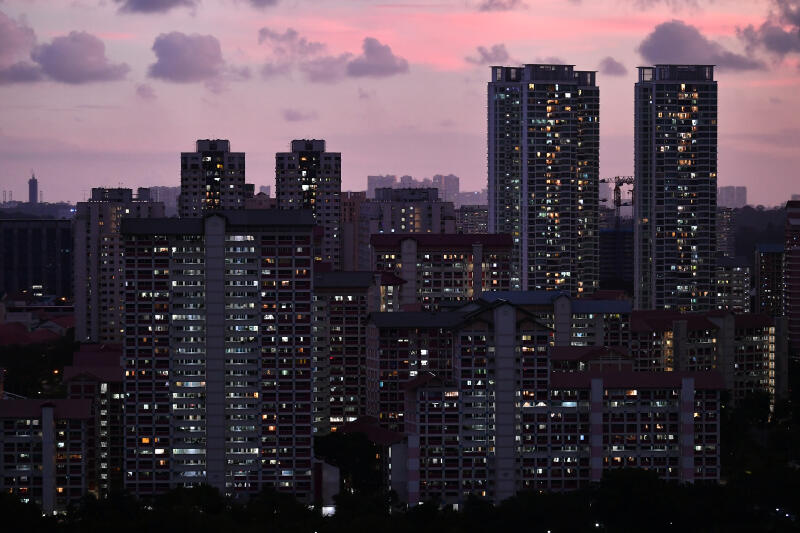Singapore electricity tariffs rise by about 10% amid Ukraine war
Sign up now: Get ST's newsletters delivered to your inbox

The electricity tariff for the period April 1 to June 30 will be 27.94 cents per kilowatt-hour (kWh).
PHOTO: ST FILE
SINGAPORE - Most households will pay higher electricity bills for the next three months, with the electricity tariff for the next quarter going up by about 10 per cent as the Russia-Ukraine war persists.
The electricity tariff for the period April 1 to June 30 will be 27.94 cents per kilowatt-hour (kWh), excluding the goods and services tax (GST), said grid operator SP Group on Thursday (March 31). This is up from the current rate of 25.44 cents per kWh.
SP Group said households living in a four-room Housing Board flat - which typically consumes about 349kWh of electricity a month - can expect their average monthly electricity bill to go up by $8.73, excluding GST, almost double the increase in the previous quarter.
Next quarter’s hike averages 9.9 per cent, or 2.49 cents per kWh, compared with the previous quarter, SP Group said.
The electricity tariff has been rising since April last year.
"The increase is mainly due to higher energy cost arising from significantly higher global gas and oil prices exacerbated by the conflict in Ukraine," it added.
In a separate statement on Thursday, City Energy said the gas tariff for households in the next quarter will rise to 21.66 cents per kWh, excluding GST, up from 20.21 cents per kWh.
“The increase is due to higher fuel and non-fuel costs compared with the previous quarter,” said City Energy, which provides piped gas to more than 870,000 consumers.
In recent months, electricity prices have increased worldwide after gas prices hit record levels. This is due to a confluence of factors including unanticipated demand for gas from pandemic-recovery, severe weather events and reductions in the global gas supply.
While the global energy crisis was expected to ease as winter wanes, fears of production shortages in oil and gas have escalated since Russia invaded Ukraine five weeks ago. Russia holds 12 per cent of the world's oil supply and 17 per cent of its natural gas.
Any disruption to gas and oil will affect countries reliant on gas imports such as Singapore, which depends on imported gas for about 95 per cent of its electricity needs.
The electricity tariff in Singapore is calculated from four components.
Fuel costs, which reflect the cost of imported natural gas and track the price of oil, make up about half of the tariff. The rest covers other costs related to activities such as maintenance of power plants, meter-reading and transporting electricity through the grid.
This quarter's electricity tariff has risen in tandem with fuel costs, which have risen by about 20 per cent compared with the first quarter of this year.
The regulated electricity tariff set by SP Group is reviewed each quarter and approved by industry regulator Energy Market Authority (EMA).
About half of households here buy electricity from SP Group under the regulated tariff. Other consumers on fixed price plans with retailers will not see any price increases until they renew their contracts, where they are likely to see higher prices.
Still, the revised tariff for the next three months remains lower than the peak tariff in the past decade, which was 28.78 cents per kWh, excluding GST, in the second quarter of 2012, as well as the highest recorded tariff in Singapore at 30.45 cents per kWh, excluding GST, in the fourth quarter of 2008.
The regulated tariff hike comes as Singapore bolsters efforts to secure its energy supply and support consumers here amid volatile electricity prices.
On Thursday, EMA announced the extension of energy security measures as well as a one-month extension to a scheme that helps large electricity users secure temporary fixed price contracts.
Separately, the Ministry of Finance said about 950,000 lower- to middle-income households here living in HDB flats will receive vouchers to defray GST and other living expenses as announced in this year's Budget.
The vouchers disbursed to these households amount to about eight to 10 months' worth of utility bills for the average household living in one- and two-room flats, and about four to six months for those living in three- and four-room flats.

The rising electricity tariff over the past few months has led user experience designer Masturah Maidin, 32, to cut back on her electricity usage, especially with work-from-home arrangements adding to her power bills.
“I heard that the electricity prices could be increasing due to the Russian invasion of Ukraine and this means I’ll have to be more careful about my usage.
“But what we all need is peace instead of war,” she added.
Mr Peter Hoskins, 54, who works in the media industry, said the cost increase is still “just about manageable”.
A 20 per cent jump, however, would definitely make him use less air-conditioning at home, he added.
OCBC economist Howie Lee said the new normal of high oil and gas prices is here to stay, not just in Singapore but globally, because of the reconfiguration of international energy trade triggered by the Russia-Ukraine war.
He said that energy prices are unlikely to stabilise in two to three years.
With energy being key to the production of goods and services, this will trickle down to a higher cost of living, he said.
Hopefully, he added, this change will not slow the transition to renewable energy as Singapore secures its energy supply.



